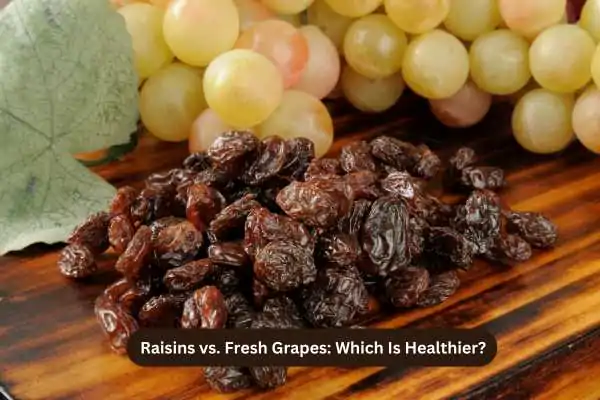When choosing between raisins and fresh grapes, it’s easy to assume they offer the same health benefits—after all, raisins are simply dried grapes. However, the drying process significantly alters their nutritional content, concentration of sugars, and overall impact on your health. For people in the UK looking to make informed dietary choices, understanding the key differences can help you decide which one better fits your lifestyle.

In this article, we compare raisins and fresh grapes across several health categories, including nutritional value, sugar content, fibre, antioxidants, and more. By the end, you’ll have a clear picture of which fruit better aligns with your personal health goals.
Nutritional Profile: Raisins vs. Fresh Grapes
Fresh Grapes
Fresh grapes are mostly made up of water, which makes them naturally hydrating and low in calories. A standard 100g serving of fresh grapes contains:
-
Calories: 69 kcal
-
Carbohydrates: 18g
-
Sugars: 16g
-
Fibre: 0.9g
-
Vitamin C: 10% of the Daily Value (DV)
-
Water: About 80%
Fresh grapes are rich in vitamin C and vitamin K, and they contain small amounts of potassium and antioxidants such as resveratrol.
Raisins
Raisins, being dehydrated, are more calorie-dense and nutrient-concentrated. A 100g serving of raisins provides:
-
Calories: 299 kcal
-
Carbohydrates: 79g
-
Sugars: 59g
-
Fibre: 3.7g
-
Iron: 10% of the DV
-
Potassium: 20% of the DV
Because water is removed during drying, nutrients like iron and potassium become more concentrated, but so do the sugars and calories.
Sugar and Calorie Content
One of the most noticeable differences between raisins and grapes is sugar concentration. A handful of raisins may contain the sugar equivalent of an entire bunch of grapes.
For individuals monitoring their blood sugar levels, such as those with diabetes or those aiming to reduce added sugar intake, fresh grapes are generally a safer, lower-glycaemic option. Raisins, while natural, can spike blood sugar more quickly due to their concentrated glucose and fructose content.
Fibre and Digestive Health
Raisins take the lead when it comes to dietary fibre. The drying process condenses fibre content, making raisins a better source per serving. This can aid digestion, prevent constipation, and support overall gut health.
However, because raisins are more concentrated, it’s easy to overeat them, leading to excess calorie and sugar intake despite their digestive benefits.
Antioxidants and Disease Prevention
Both raisins and grapes are rich in antioxidants, particularly polyphenols like flavonoids and resveratrol. These compounds have been linked to:
-
Reduced inflammation
-
Lowered risk of heart disease
-
Slower cellular ageing
-
Improved brain function
Fresh grapes, especially red and black varieties, are known for their high resveratrol content. However, raisins retain many of their antioxidants through the drying process. That said, the heating involved in commercial drying may reduce some of the antioxidant potency compared to fresh grapes.
Satiety and Portion Control
Due to their water content, fresh grapes are more volumetric, meaning you can eat more of them for fewer calories. This makes them more filling and suitable for weight management. For example, 100g of fresh grapes contains around 70 calories, whereas the same weight of raisins packs nearly 300 calories.
If you’re aiming to feel full without consuming too many calories, grapes are the better option. On the other hand, raisins are more portable and require no refrigeration, making them a convenient, albeit denser, snack.
Suitability for Special Diets
-
For diabetics: Fresh grapes are the safer choice due to lower sugar concentration and slower glucose absorption.
-
For athletes or those needing energy boosts: Raisins offer a quick, natural sugar source ideal for pre- or post-workout fuel.
-
For children: Grapes are a hydrating snack, but should be cut to avoid choking hazards. Raisins, while safe in small quantities, can stick to teeth and contribute to cavities if not followed with water or brushing.
The Verdict: Which One Is Healthier?
Both raisins and fresh grapes have unique health advantages, but the better option depends on your nutritional goals.
Choose fresh grapes if:
-
You’re watching your sugar or calorie intake
-
You want a refreshing, hydrating snack
-
You’re focused on weight management
Choose raisins if:
-
You need an energy-dense snack
-
You’re looking to increase fibre and iron intake
-
You’re on the go and need something portable
In moderation, both can be part of a healthy, balanced diet. The key is portion control—while it’s easy to snack on handfuls of raisins, their sugar and calorie load can add up quickly. Grapes, on the other hand, allow for more generous servings with fewer nutritional drawbacks.
Final Thoughts
In the battle of raisins vs. fresh grapes, there is no clear winner across the board. Each option offers distinct benefits suited to different lifestyles and health needs. For most people in the UK following a balanced diet, incorporating both in sensible amounts can offer variety, flavour, and valuable nutrition.
Whether you’re reaching for the juicy burst of fresh grapes or the chewy sweetness of raisins, being mindful of your intake will help you make the healthier choice for your body and lifestyle.

